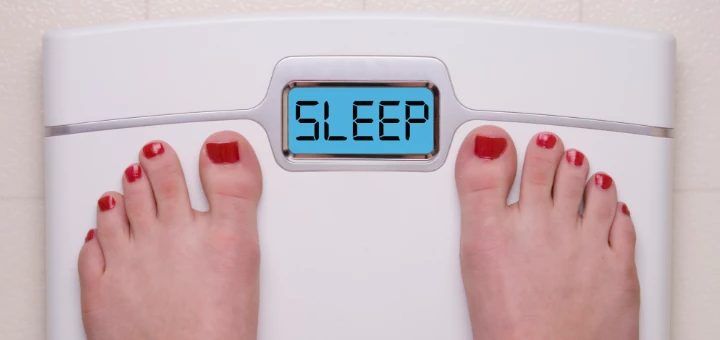Another Reason to Sleep More: Can Sleep Loss Lead to Weight Gain?

Most of us do not practice yoga for weight management, but we all know that maintaining a healthy weight helps the body function more efficiently. It is common knowledge that our ability to manage weight depends on two main factors: diet and exercise. It turns out that sleep also plays a prominent role in whether or not you will be able to lose weight or maintain it.
Studies show that sleep loss can lead to weight gain because it impacts us in three major areas.
1. Feeling Hungry or Full
There are two main hormones that control appetite: leptin and ghrelin. When leptin levels are high, you feel full and don’t want to eat. In contrast, when ghrelin levels are high, you feel hungry. Usually, when the levels of one hormone go up, the levels of another one go down.
The balance between those two hormones gets interrupted without sufficient sleep. Dr. Eve Cauter at the University of Chicago demonstrated that “inadequate sleep decreased concentrations of the satiety-signaling hormone leptin and increased levels of the hunger-instigating hormone ghrelin.”(2) As a result, sleep-deprived individuals lost their hunger control.
Their appetite remains unsatisfied, no matter how much they eat. They would consume about 300 calories more each day, which roughly adds up to extra 70,000 calories a year (even if you allow for a month of vacation with plenty of sleep). This would mean 10-15 pounds of weight gain per year.
2. Snacking 
Further studies by Dr. Cauter and Dr. Walker show that sleep-deprived individuals can consume an additional 330 calories in snack foods after a full meal because of increased levels of endocannabinoids (chemicals that stimulate appetite), which “give you the munchies.” And eating more snacks is not the only problem. In addition, “high-calorie foods became significantly more desirable in the eyes of the participants who were sleep deprived.”(3)
This happens because the supervisory regions of the brain in the prefrontal cortex that usually control our urges were silenced by the lack of sleep. That is why the participants were drawn to sweets (cookies, ice cream), carbohydrate-rich foods (bread, pasta), and salty snacks (potato chips, pretzels).

The good news is that plentiful sleep can help you stop the munchies. “We found that a full night of sleep repairs the communication pathway between deep-brain areas that unleash hedonic desires and higher-order brain regions whose job it is to rein in these cravings. Ample sleep can, therefore, restore a system of impulse control within your brain, putting the appropriate brakes on potentially excessive eating.”(3)
3. Dieting
Any time you go on a diet, you try to control your calorie intake in hopes of losing weight. It turns out that the kind of weight loss you experience will be very different depending on how much you sleep. When researchers put a group of overweight men and women on a strict low-calorie diet for two weeks, they found that all participants had lost weight, but “when given just five-and-a-half hours of sleep opportunity, more than 70 percent of the pounds lost came from lean body mass—muscle, not fat.”

In contrast, in the group that slept for eight-and-a-half hours, “a far more desirable outcome was observed, with well over 50 percent of weight loss coming from fat while preserving muscle. When you are not getting enough sleep, the body becomes especially stingy about giving up fat. Instead, muscle mass is depleted while fat is retained.”(3) So it becomes counterproductive to get up extra early to exercise for the purposes of losing weight if you stayed up late.
Whether you are trying to shed a few pounds or are just focused on maintaining your current weight, “short sleep (of the type that many adults in first-world countries commonly and routinely report) will increase hunger and appetite, compromise impulse control within the brain, increase food consumption (especially of high-calorie foods), decrease feelings of food satisfaction after eating, and prevent effective weight loss when dieting.”(3)
Also read Your Brain on Meditation: Using Yoga’s Limbs to Achieve Pure Awareness by Olga Kabel.
Study with Olga Kabel and YogaUOnline – Yoga for Every Body: How to Adapt Yoga Poses for Different Situations, Conditions, and Purposes.
Reprinted with permission from Sequence Wiz.
 Educated as a school teacher, Olga Kabel has been teaching yoga for over 14 years. She completed multiple Yoga Teacher Training Programs but discovered the strongest connection to the Krishnamacharya/ T.K.V. Desikachar lineage. She had studied with Gary Kraftsow and American Viniyoga Institute (2004-2006) and received her Viniyoga Teacher diploma in July 2006 becoming an AVI-certified Yoga Therapist in April 2011. Olga is a founder and managing director of Sequence Wiz-a web-based yoga sequence builder that assists yoga teachers and yoga therapists in creating and organizing yoga practices. It also features simple, informational articles on how to sequence yoga practices for maximum effectiveness. Olga strongly believes in the healing power of this ancient discipline on every level: physical, psychological, and spiritual. She strives to make yoga practices accessible to students of any age, physical ability, and medical history specializing in helping her students relieve muscle aches and pains, manage stress and anxiety, and develop mental focus.
Educated as a school teacher, Olga Kabel has been teaching yoga for over 14 years. She completed multiple Yoga Teacher Training Programs but discovered the strongest connection to the Krishnamacharya/ T.K.V. Desikachar lineage. She had studied with Gary Kraftsow and American Viniyoga Institute (2004-2006) and received her Viniyoga Teacher diploma in July 2006 becoming an AVI-certified Yoga Therapist in April 2011. Olga is a founder and managing director of Sequence Wiz-a web-based yoga sequence builder that assists yoga teachers and yoga therapists in creating and organizing yoga practices. It also features simple, informational articles on how to sequence yoga practices for maximum effectiveness. Olga strongly believes in the healing power of this ancient discipline on every level: physical, psychological, and spiritual. She strives to make yoga practices accessible to students of any age, physical ability, and medical history specializing in helping her students relieve muscle aches and pains, manage stress and anxiety, and develop mental focus.
References
1. Why We Sleep: Unlocking the Power of Sleep and Dreams by Matthew Walker
2. Sleep influences on obesity, insulin resistance, and risk of type 2 diabetes by S. Reutrakul and E. Van Cauter
3. Studies by Dr. Eve Van Cauter on lack of sleep and obesity




